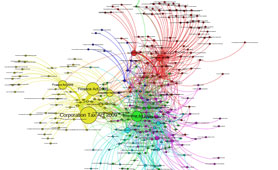 The National Archives was recently successful in securing funding for two bids to the Arts and Humanities Research Council’s Big Data fund. We are really excited that both projects were awarded grades for ‘an outstanding proposal that is world-leading in all of the following: scholarship; originality; quality; and significance’.
The National Archives was recently successful in securing funding for two bids to the Arts and Humanities Research Council’s Big Data fund. We are really excited that both projects were awarded grades for ‘an outstanding proposal that is world-leading in all of the following: scholarship; originality; quality; and significance’.
The projects are being financed through the £4.6m ‘Digital Transformations in the Arts and Humanities: Big Data Research’ initiative, funded by the Arts and Humanities Research Council. The projects are two of 21 around the country which aim to make ‘big data’ information more accessible and easier to interpret by the public.
Traces through time
Dr Sonia Ranade will lead collaboration with the Institute of Historical Research, Leiden University and Brighton University to develop a methodology to identify and trace individuals across large and diverse historical datasets. The approach will look particularly at ‘fuzzy’ data (such as aliases, incomplete data, spelling variations and errors) which are common features of historical data – and which currently present researchers with particular difficulties in confidently identifying the same individual across different historical sources, or even within a single source. Applying the methodology will expose the underlying links and patterns in the data, enabling the identification of events in the lives of real people. This work has the ability to radically transform search and discovery for researchers, and is a tremendously exciting piece of work.
Legislation Data Research Infrastructure
Led by John Sheridan, the Head of Legislation Services, this project will create an entirely new set of big data assets – a Legislation Data Research Infrastructure – to research the content and evolution of UK legislation. Working with Co-Investigators at the Institute of Advanced Legal Studies and the University of Cambridge, it will facilitate research into the possibility of a legislation pattern language which could create the first ever ‘map’ of the statute book. The project team will work with users of legislation.gov.uk to explore whether certain design patterns help or hinder their comprehension of the legal meaning of the text. It will strengthen The National Archives’ reputation as a world leader in legal informatics and deliver new capabilities and tools that will enable us to better contextualize legislation to users of legislation.gov.uk, removing barriers to understanding and use.
This success is the result of a huge amount of work from the Legislation, Technology and Research Teams, and we’re really proud and excited by winning both bids in a very competitive field. The National Archives will be able to pioneer these new technologies, and deliver better public services. Congratulations to everyone involved, and please watch the blog for further updates.
This will pretty much create “facebook” profiles of our ancestors ?
I wonder what implications the results of your project on Traces Through Time will have for the validity of the proposed (pseudo)anonymization of records in the NHS’s Summary Care Record exercise and similar projects.